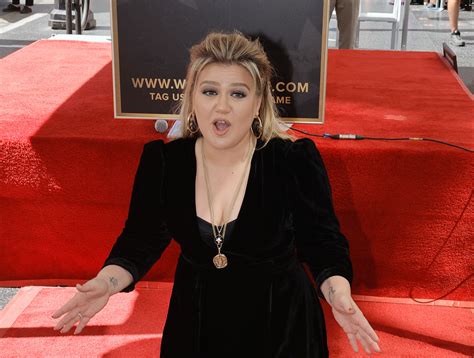
Kelly Clarkson’s departure from her daytime talk show is generating considerable speculation, with new reports suggesting that a toxic work environment may have contributed to her decision, despite public statements citing a desire to prioritize her family and relocate to New York City. Sources close to the production allege that behind the scenes, the show was plagued by overwork, understaffing, and a general lack of support, creating a stressful and unsustainable atmosphere for many employees.
Kelly Clarkson’s Departure: Unveiling Potential Workplace Issues Behind the On-Screen Cheer
Kelly Clarkson’s announcement that she would be concluding her daytime talk show after four seasons has prompted a wave of discussion and conjecture. While Clarkson has publicly stated that her decision was motivated by a desire to spend more time with her children and relocate to New York City, recent reports suggest that underlying issues within the show’s work environment may have played a significant role.
According to insiders, the production of “The Kelly Clarkson Show” was marked by persistent overwork, chronic understaffing, and an overall lack of adequate support for employees. These conditions allegedly fostered a toxic atmosphere that contributed to employee burnout and dissatisfaction. These revelations raise questions about the true reasons behind Clarkson’s exit and whether the publicly stated reasons fully represent the complexities of her choice.
Behind the Scenes: Allegations of Overwork and Understaffing
Several anonymous sources who claim to have worked on “The Kelly Clarkson Show” have described a demanding and often unsustainable work environment. One source stated, “Everybody is overworked and underpaid. It’s kind of the Kelly Show swan song because everybody is leaving.” This sentiment paints a picture of a production struggling to maintain its workforce due to unfavorable working conditions.
The allegations of overwork are particularly concerning, with employees reportedly facing long hours and relentless deadlines. The pressure to consistently deliver high-quality content while operating with a limited staff is said to have created a stressful environment for many. “They are burning through people,” another source claimed, highlighting the rapid turnover rate and the difficulty in retaining staff.
Understaffing, according to these reports, exacerbated the problem. With fewer people available to handle the workload, the existing employees were forced to take on additional responsibilities, leading to increased stress and burnout. This issue was further compounded by what some described as a lack of adequate support from management, leaving employees feeling overwhelmed and unsupported.
The Impact on Employee Morale and Well-being
The combination of overwork, understaffing, and perceived lack of support allegedly had a detrimental impact on employee morale and well-being. Sources describe a tense and stressful atmosphere where employees felt undervalued and unable to voice their concerns. This environment, according to these claims, contributed to a high turnover rate and a general sense of dissatisfaction among the staff.
The emotional toll of working in such an environment can be significant. Constant pressure, long hours, and limited resources can lead to burnout, anxiety, and other mental health issues. The allegations suggest that “The Kelly Clarkson Show” may have inadvertently created a work environment that prioritized productivity over the well-being of its employees.
Clarkson’s Perspective and Public Statements
While the reports of a toxic work environment raise serious concerns, it is important to consider Kelly Clarkson’s perspective and her public statements regarding her departure. Clarkson has consistently maintained that her decision to end the show was primarily driven by her desire to spend more time with her children and to relocate to New York City, where she can be closer to her family.
In an Instagram post, Clarkson wrote, “I’ve made the difficult decision to move ‘The Kelly Clarkson Show’ to New York for season 5.” She emphasized the importance of being closer to her family and expressed her excitement about the new chapter. “I am so excited for this new adventure,” she added.
Clarkson’s public statements present a different narrative than the one painted by the anonymous sources. It is possible that both narratives contain elements of truth. Clarkson may have genuinely wanted to prioritize her family and relocate, while also being aware of the challenges and issues within the show’s work environment.
NBCUniversal’s Response and Investigation
Following the publication of the initial reports alleging a toxic work environment, NBCUniversal, the company that produces “The Kelly Clarkson Show,” issued a statement acknowledging the concerns and committing to taking appropriate action.
“We are committed to a safe and respectful work environment and take workplace complaints very seriously,” the statement read. “We are looking into the matter and will take appropriate action as necessary.”
NBCUniversal’s response indicates that the company is aware of the allegations and is taking them seriously. The investigation will likely involve interviewing employees, reviewing internal documents, and assessing the overall work environment. The findings of the investigation could have significant implications for the future of the show and the way NBCUniversal manages its daytime programming.
Industry Context: Challenges in Daytime Television Production
The allegations surrounding “The Kelly Clarkson Show” highlight the broader challenges faced by many daytime television productions. The pressure to deliver high-quality content on a daily basis, coupled with tight budgets and demanding schedules, can create a stressful environment for both on-screen talent and behind-the-scenes staff.
Daytime television often operates on a lean budget, with limited resources allocated to staffing and support services. This can lead to overwork, understaffing, and a general sense of being stretched thin. The constant pressure to generate ratings and attract advertisers adds to the stress and can contribute to a toxic work environment.
The industry is also facing increased competition from streaming services and other forms of entertainment. This competition puts even more pressure on daytime television shows to innovate and deliver compelling content, further exacerbating the challenges faced by employees.
The Role of Leadership and Management
Effective leadership and management are crucial in creating a positive and supportive work environment. Leaders who prioritize employee well-being, provide adequate resources, and foster open communication can help mitigate the risks of overwork, understaffing, and burnout.
Conversely, ineffective leadership can exacerbate these problems. A lack of clear communication, a failure to address employee concerns, and a focus on productivity at the expense of well-being can all contribute to a toxic work environment.
The allegations surrounding “The Kelly Clarkson Show” raise questions about the role of leadership and management in creating and maintaining a healthy work environment. The investigation by NBCUniversal will likely focus on these issues and seek to identify areas where improvements can be made.
Potential Consequences and Future Implications
The allegations of a toxic work environment at “The Kelly Clarkson Show” could have several potential consequences. The show’s reputation may be tarnished, making it more difficult to attract and retain talent. NBCUniversal could face legal action from employees who claim to have been harmed by the alleged working conditions.
The investigation by NBCUniversal could also lead to significant changes in the way the show is produced and managed. These changes could include increased staffing levels, improved training and support for employees, and a greater emphasis on work-life balance.
The allegations could also have broader implications for the daytime television industry as a whole. They could prompt other networks and production companies to re-evaluate their own work environments and take steps to ensure that their employees are treated fairly and with respect.
The Power Dynamics in Entertainment
The entertainment industry, known for its glamour and high-profile figures, often masks underlying power dynamics that can contribute to toxic work environments. The hierarchical structure, intense competition, and the pressure to maintain a certain image can create an atmosphere where employees feel vulnerable and unable to speak out against mistreatment.
In the case of “The Kelly Clarkson Show,” the allegations of overwork and understaffing suggest a potential imbalance of power between management and employees. The fear of losing their jobs may have prevented employees from voicing their concerns, allowing the alleged toxic environment to persist.
Addressing these power dynamics requires a commitment to transparency, accountability, and a willingness to challenge the status quo. It also requires creating a culture where employees feel safe and empowered to speak out against mistreatment without fear of reprisal.
The Importance of Mental Health and Well-being
The allegations surrounding “The Kelly Clarkson Show” underscore the importance of prioritizing mental health and well-being in the workplace. The demanding nature of daytime television production can take a toll on employees’ mental health, leading to burnout, anxiety, and other issues.
Employers have a responsibility to create a work environment that supports the mental health and well-being of their employees. This includes providing access to mental health resources, promoting work-life balance, and fostering a culture of open communication and support.
The stigma surrounding mental health can also prevent employees from seeking help when they need it. Employers can help to break down this stigma by normalizing conversations about mental health and encouraging employees to prioritize their well-being.
Navigating the Future: Lessons Learned
The situation surrounding “The Kelly Clarkson Show” offers several valuable lessons for the entertainment industry and beyond. These lessons include the importance of:
- Prioritizing employee well-being: Creating a work environment that supports the mental and physical health of employees is essential for attracting and retaining talent.
- Addressing power dynamics: Recognizing and addressing the power imbalances that can contribute to toxic work environments is crucial for creating a fair and equitable workplace.
- Fostering open communication: Encouraging employees to voice their concerns and providing a safe and supportive environment for them to do so is essential for identifying and addressing problems.
- Holding leadership accountable: Holding leaders accountable for creating and maintaining a healthy work environment is crucial for ensuring that these values are upheld.
- Transparency and Accountability: Demonstrating transparency in investigations and holding individuals accountable for misconduct can foster trust and demonstrate a commitment to change.
By learning from these lessons, the entertainment industry can create a more positive and sustainable work environment for all.
The Human Cost of Entertainment
The entertainment industry, while often celebrated for its creativity and glamour, frequently demands a high price from its workforce. Long hours, intense pressure, and the constant pursuit of perfection can take a toll on the physical and mental well-being of those who work behind the scenes. The allegations surrounding “The Kelly Clarkson Show” serve as a stark reminder of the human cost of entertainment and the need for greater attention to the well-being of those who contribute to its creation.
A Call for Industry-Wide Change
The situation with “The Kelly Clarkson Show” is not an isolated incident. It reflects a broader pattern of issues within the entertainment industry, including overwork, understaffing, and a lack of support for employees. This case should serve as a call for industry-wide change, prompting networks, production companies, and talent agencies to re-evaluate their practices and prioritize the well-being of their workforce.
The Role of Unions and Advocacy Groups
Unions and advocacy groups play a crucial role in protecting the rights and interests of entertainment industry workers. These organizations can provide support, resources, and legal representation to employees who have experienced mistreatment or unfair working conditions. They can also advocate for policies and practices that promote a healthier and more equitable work environment.
The Impact on Kelly Clarkson’s Career
The allegations surrounding “The Kelly Clarkson Show” could also have an impact on Kelly Clarkson’s career. While she has not been directly implicated in the alleged toxic work environment, her name is inevitably associated with the show. The negative publicity could potentially affect her public image and her future career opportunities.
However, it is also possible that Clarkson could emerge from this situation stronger and more respected. By acknowledging the concerns and taking steps to address them, she could demonstrate her commitment to creating a positive and supportive work environment.
The Broader Societal Context
The allegations surrounding “The Kelly Clarkson Show” also reflect broader societal trends and concerns about workplace culture and employee well-being. In recent years, there has been a growing awareness of the importance of mental health, work-life balance, and creating a positive and supportive work environment.
Employees are increasingly demanding that their employers prioritize their well-being and provide them with the resources and support they need to thrive. Employers who fail to meet these demands risk losing talent and damaging their reputations.
The Future of “The Kelly Clarkson Show”
The future of “The Kelly Clarkson Show” remains uncertain. While the show is officially ending its run, there is a possibility that it could be revived in some form in the future. However, any future iteration of the show would likely need to address the concerns raised about the work environment and demonstrate a commitment to creating a positive and supportive workplace.
NBCUniversal is now handing the daytime slot to “The Jennifer Hudson Show.”
The Need for Continuous Improvement
Creating a positive and supportive work environment is not a one-time fix. It requires continuous effort and a commitment to ongoing improvement. Employers must be willing to listen to their employees, address their concerns, and adapt their practices as needed.
By embracing a culture of continuous improvement, the entertainment industry can create a more sustainable and equitable work environment for all.
The Ethical Considerations
The situation surrounding “The Kelly Clarkson Show” raises important ethical considerations about the responsibilities of employers to their employees. Employers have a moral and ethical obligation to create a work environment that is safe, respectful, and supportive. They must also be willing to address issues of mistreatment and inequality.
Failure to meet these ethical obligations can have serious consequences, both for the employees involved and for the reputation of the employer.
Conclusion
The allegations of a toxic work environment at “The Kelly Clarkson Show” highlight the challenges and complexities of creating a positive and sustainable workplace in the entertainment industry. While Kelly Clarkson’s stated reasons for leaving the show focus on family and relocation, the claims of overwork, understaffing, and lack of support suggest deeper issues at play. The investigation by NBCUniversal will be crucial in uncovering the truth and implementing changes to prevent similar problems in the future. The situation serves as a reminder of the importance of prioritizing employee well-being, addressing power dynamics, and fostering open communication in all workplaces. Ultimately, a focus on ethical considerations and continuous improvement is necessary to ensure a fair and respectful environment for all individuals involved in the demanding world of entertainment.
Frequently Asked Questions (FAQ)
-
Why is Kelly Clarkson ending her talk show?
Kelly Clarkson has publicly stated that she is ending her talk show to spend more time with her children and to relocate to New York City, where she can be closer to her family. However, reports have surfaced suggesting that a toxic work environment may have also contributed to her decision.
-
What are the allegations about the work environment on “The Kelly Clarkson Show”?
Sources claim that the show was plagued by overwork, understaffing, and a lack of support for employees, creating a stressful and unsustainable atmosphere. Some employees described being “burned through” due to the high demands and limited resources.
-
What has NBCUniversal said about the allegations?
NBCUniversal has stated that they are committed to a safe and respectful work environment and take workplace complaints very seriously. They are looking into the matter and will take appropriate action as necessary. “We are committed to a safe and respectful work environment and take workplace complaints very seriously,” the statement read. “We are looking into the matter and will take appropriate action as necessary.”
-
What impact could these allegations have on Kelly Clarkson’s career?
The allegations could potentially tarnish Kelly Clarkson’s reputation, as her name is associated with the show. However, if she addresses the concerns and takes steps to improve the work environment, she could emerge stronger and more respected.
-
What can be learned from this situation about workplace culture in the entertainment industry?
The situation highlights the importance of prioritizing employee well-being, addressing power dynamics, and fostering open communication in the entertainment industry. It underscores the need for continuous improvement and ethical considerations in creating a fair and respectful work environment.









